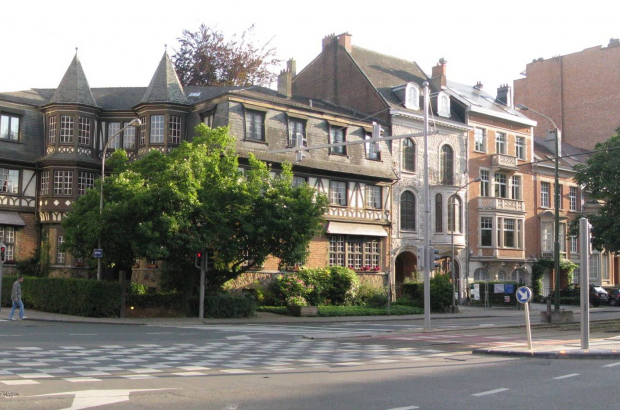- Daily & Weekly newsletters
- Buy & download The Bulletin
- Comment on our articles
Up my street: The Bulletin’s neighbourhood guide to Uccle
With 82,000 people sharing 23km2, Uccle in the south is one of Brussels’ least densely populated municipalities. A chunk of the Bois de la Cambre and Foret des Soignes are within its borders, as are the European School I and various foreign embassies. We asked Bulletin readers to tell us what they like about living here.
“There is a sense of community in Uccle that I think you won’t get everywhere. We are lucky to have wonderful neighbours in the building and in the local streets,” says Sandy from Ireland, who’s lived here for almost 10 years. “People of all ages and circumstances should enjoy living in Uccle, but it’s probably best for families or older people. The schools are good but can have long waiting lists. A lot of well-off older people choose Uccle as their place to retire and there are always a lot of apartments to let, but finding a nice one for less than €1,500 per month gets difficult. And in the part of Uccle closer to the city, finding an apartment with parking can also be difficult.”
Uccle is a sprawling commune with centres like Place Saint-Job or Parvis Saint-Pierre full of restaurants and bars, she says. “But there are also quieter parts that could do with a bakery or a cafe. We live very close to the borders of Forest, Saint-Gilles and Ixelles and when we go out we are move likely to end up in one of those communes. We could do with more informal dining options around the northern part of Uccle.”
“I’ve lived in Uccle for five years. It’s pretty and green, with lovely buildings, friendly people, great shops and restaurants,” says Ciara, also from Ireland. “And the staff at the town hall have been super helpful, well organised and accessible.” “Uccle is a peaceful and secure place to live, though rental prices are high,” adds Louis, who moved here from New York City 15 years ago.
Joel from the Philippines describes the area as “fantastic, and the people are kind. The place is accessible by all means of transportation, though the rental costs are a bit expensive. I love all the parks, cafes and shops, and there are cultural and social events happening throughout the year.”
“It’s a pretty laid-back, beautiful part of town,” according to one American resident, who appreciates it for “the incredibly beautiful” architecture and houses but would like to see more restaurants. Lisa from the UK describes it as “varied, beautiful and safe”, and appreciates “being near both the forest and some beautiful buildings: I enjoy just wandering about.” There’s not a lot she’d change about life here – except perhaps for “the development of a poop-scoop culture for dog owners!”
“It’s green, quiet, and close to Saint-Gilles,” adds a German resident who’s lived here for four years. They told us there is better air quality here, but public transport tends to be too slow as it has to share the space with cars. “Uccle is a green, wealthy suburb,” according to a resident from the UK who’s been living in the area for more than 20 years. “It’s a safe neighbourhood, near to the city but also close to numerous green spaces. On the downside, there are traffic jams, especially at weekends, and lots of characterful buildings are being replaced by ugly flat-roofed modern apartment blocks.”
Uccle has several stations on the S-train network, on the Nivelles-Mechelen, Geraardsbergen-Mechelen and Halle-Mechelen lines. The latter two link Uccle to the EU quarter via Schuman and Merode. It’s also served by trams and buses, as well as pre-metro 3 and 4.
Living here comes with a relatively high price tag, however, with property in Uccle among the most expensive in the city. Two-bedroom apartments are frequently rented for upwards of €1,250 per month, with many costing more than €1,500, according to property website Immoweb. There are numerous four-bedroom houses on the market for around €700,000, with larger villas costing more than €1 million. Smaller houses in busier areas can be found for around €350,000.
Favourite spots
Longchamp swimming pool • Bois de la cambre • Forêt des Soignes • Fort Jaco and Rue Vanderkindere for shopping • Cook & Book • Pain Quotidien • Charlotte restaurant • Place Saint-Job • Parc de la Sauvagère • Wolvendael Park • Le Guignol and Le Pigeon Noir French restaurants • Pasta Commedia • Relais St-Job brasserie • Rue Xavier de Bue • Parvis Saint-Pierre • Tranches de cake artisan bakery • Broebbeleir for smart fast food • Shopping at Vivier d’oie • Cafe Maris seafood restaurant • David Lloyd sports centre • Kauwberg nature reserve • Ferme d’Uccle • Le Cabestan cafe and restaurant, open 24/7 • Au Vieux Spuitigen Duivel historical bistro and bar • Dieweg cemetery • Retrofaktory vintage furniture store
Positives
- Peaceful and green
- Family-friendly with lots of activities for children
- Good public transport
- Beautiful houses
- Feels safe
- Good choice of shops, restaurants and cultural activities
Negatives
- Expensive property
- Traffic jams
- Public transport can be slow
- Not many bars
















